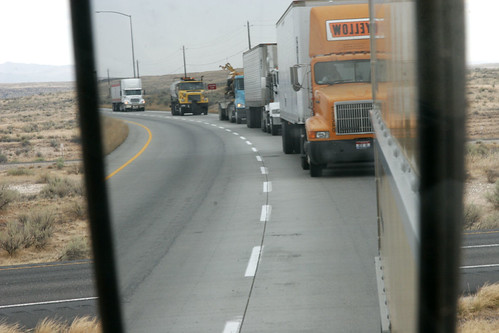(Source articles contributing to this hybrid report: Business Week, CNN, Star Tribune)
A Continental Express pilot tried fervently to get her passengers into the Rochester, Minn., airport on Aug. 8 after being diverted from Minneapolis-St. Paul because of bad weather, according to federal transportation officials. The request was denied by Mesaba Aviation, a unit of Delta Air Lines (DAL), the 47 passengers were stuck on the small regional jet for more than six hours.

Mesaba, based in Eagan, Minnesota and owned by Delta Air Lines, was the only carrier able to assist Continental Flight 2816, which was on its way from Houston, Texas, to Minneapolis, Minnesota, when it was diverted because of strong thunderstorms, LaHood said. The flight’s 47 passengers described crying babies, overflowing toilets and cramped conditions.
U.S. Transportation Secretary Ray LaHood said a representative of Mesaba Airlines improperly refused requests by the plane’s captain and crew to let passengers off the plane. They remained stuck on the tarmac in Rochester on August 8 from 12:38 a.m. to about 6 a.m. with nothing but pretzels to eat, LaHood said.
“We have determined that the Express Jet crew was not at fault. In fact, the flight crew repeatedly tried to get permission to deplane the passengers at the airport or obtain a bus for them,” U.S. Dept. of Transportation Secretary Ray LaHood said in an Aug. 21 statement. “The local representative of Mesaba Airlines improperly refused the requests of the captain to let her passengers off the plane. The representative incorrectly said that the airport was closed to passengers for security reasons, which led to this nightmare for those stuck on the plane.”
“There was a complete lack of common sense here,” LaHood said in a written statement. “It’s no wonder the flying public is so angry and frustrated.”

In audiotapes released by the Transportation Department, the unnamed captain of the aircraft can be heard pleading with an airline dispatcher to find a way to get the passengers off the plane. According to transcripts of transmissions from the cockpit released Friday, the pilot grew frustrated during the course of what she called a “ridiculous” ordeal, in which passengers on the nearly full plane had virtually nothing to eat, and the toilet and babies on board began to smell.
ExpressJet has posted audio files of conversations between the company and airport officials about how to resolve the problem. “There’s nobody willing to do anything,” an ExpressJet official tells the pilot in one phone call. “We have to do something… I just want to get people off the plane if we can’t fly,” the unidentified captain responds. In a later call, the pilot notes that “they’ve had lawsuits about this kind of stuff.”
“I just can’t sit here any longer,” she radioed to ExpressJet dispatchers in Houston. “… There’s no food, and [the passengers are] just getting really unhappy. … We’re stuck here with no lavs, no nothing. … There are lawsuits about this kind of stuff.”
According to a Department of Transportation preliminary report, Mesaba’s representative refused to help passengers off of the plane, incorrectly saying the airport was closed to passengers for security reasons.
The government is also soliciting public comment on whether it ought to mandate a limit on how long people may be left on planes during extended tarmac delays. A final rule from DOT is expected this fall, and the Continental Express-Mesaba imbroglio will figure into the decision, the agency says.
Mesaba is a wholly owned subsidiary of Northwest Airlines, which is a wholly owned subsidiary of Delta Air Lines.
“Mesaba respectfully disagrees with the DOT’s preliminary findings as they are incongruent with our initial internal review of the incident,” CEO John Spanjers said in a written statement. “Because Continental Express Flight 2816 diverted to an airport where they have no ground handling service, Mesaba offered assistance as a courtesy during this delay.
Delta CEO Richard Anderson said in a statement Friday that he has contacted Continental Chairman and CEO Larry Kellner to “ensure we fully understand the facts of this unfortunate incident. Delta is working with Mesaba to conduct an internal investigation, continue our full cooperation with the DOT and share all the facts with Continental.”
TransportGooru Musings: Amidst this rabid finger pointing exercise, the poor passengers are the ones who are left begging for justice at this juncture! Glad that USDOT is taking a serious look at this issue. MESABA AIRLINES = BIG FAIL!




 (Source:
(Source: